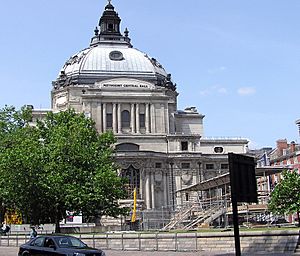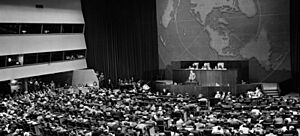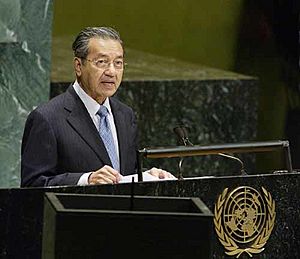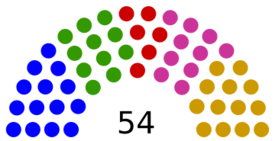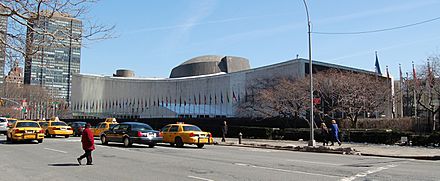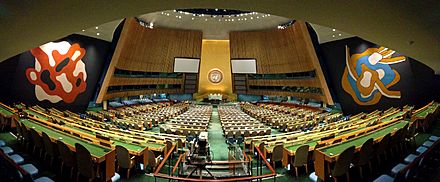United Nations General Assembly facts for kids
Quick facts for kids  |
|
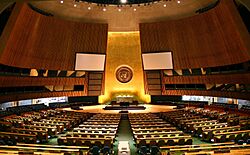
United Nations General Assembly Hall at the UN Headquarters in New York City in 2006
|
|
| Abbreviation |
|
|---|---|
| Formation | 1945 |
| Type | Principal organ |
| Legal status | Active |
| Headquarters | New York City, U.S. |
| Philémon Yang | |
|
Parent organization
|
United Nations |
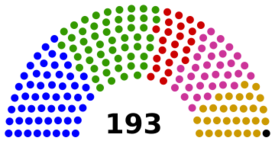
The Group of African States (54) The Group of Asia-Pacific States (54) The Group of Eastern European States (23) The Group of Latin American and Caribbean States (33) The Group of Western European and Other States (28) No group (Kiribati) |
|
The United Nations General Assembly (UNGA or GA) is one of the six main parts of the United Nations (UN). It acts as the UN's main place for discussions, making plans, and representing all member countries. It is currently in its 79th session. The rules for how it works are found in the United Nations Charter.
The UNGA is in charge of the UN's money and budget. It also chooses non-permanent members for the United Nations Security Council. The Assembly appoints the UN Secretary-General. It receives reports from other parts of the UN and makes suggestions through official resolutions. The UNGA is special because every member country has an equal say.
The General Assembly meets every year in New York City at the UN headquarters. These yearly meetings usually start in September and continue until January. Sometimes, they can also have special meetings if there's an urgent issue. The very first meeting happened on January 10, 1946, in London. Representatives from 51 founding countries were there.
Most decisions in the General Assembly are made by a simple majority vote. Each member country gets one vote. For very important matters, like peace, security, or money, a two-thirds majority vote is needed. While the Assembly's decisions on money are binding, most of its other resolutions are like strong suggestions. They are not legally binding for member countries. The Assembly can discuss almost any topic related to the UN's goals.
In the 1980s, the Assembly became a place for "North-South dialogue." This was a way for richer, industrialized nations and developing countries to talk about global issues. The number of UN members grew a lot, from 51 in 1945 to 193 today. Most of these new members are developing countries. Because there are so many of them, developing countries often help decide what the Assembly discusses. For many of these countries, the UNGA is a key way to have their voice heard globally.
Even though most resolutions are not binding, the Assembly can act if the Security Council cannot. This happens if a permanent member of the Security Council uses its veto. If there's a threat to peace, the Assembly can meet quickly. It can then suggest ways for countries to work together to keep or bring back international peace.
Contents
History of the UN General Assembly
The first meeting of the UN General Assembly happened on January 10, 1946. It was held in the Methodist Central Hall in London. Representatives from 51 countries attended this important event. After that, the Assembly met in Flushing, New York, until 1951. This was before it moved to its permanent home in Manhattan.
Between 1946 and 1951, the General Assembly also held meetings at the UN's temporary headquarters in Lake Success, New York. The Assembly moved to its permanent home in New York City on October 14, 1952. In December 1988, the Assembly held a special session in Geneva, Switzerland. This was to hear a speech from Yasser Arafat.
Who Are the Members?
All 193 countries that are members of the United Nations are also members of the General Assembly. In addition, the Holy See and Palestine are observer states. The European Union also has observer status. The General Assembly can give observer status to other international groups. This allows them to join in the work of the Assembly, but with some limits.
What's on the Agenda?
The plan for each session is made many months ahead of time. It starts with a list of topics that might be discussed. This list is made final 60 days before the session begins. Once the session starts, the final list of topics is approved. The work is then given to different committees. These committees later report back to the Assembly for final decisions.
Topics on the agenda are given numbers. Regular meetings of the General Assembly usually start on the third Tuesday of September. They are planned to last for about three months. However, because there is so much work, these sessions often continue until just before the next session begins.
Resolutions: Decisions and Statements
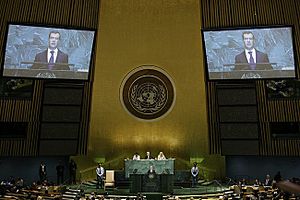
The General Assembly votes on many resolutions. These are like official statements that show what the international community thinks about different world issues. Most General Assembly resolutions are not legally binding. This is because the General Assembly does not have the power to force countries to follow them on most issues. However, the General Assembly does have the power to make final decisions on some things, like the United Nations budget.
The General Assembly can also ask the Security Council to take action on an issue. The Security Council can then make a resolution that is binding on member countries.
How Resolutions Are Numbered
For the first 30 sessions, resolutions were numbered in order. For example, Resolution 1514 (XV) was the 1514th resolution. It was adopted during the 15th session. Starting from the 31st session, resolutions are numbered by each session. For example, Resolution 41/10 means it was the 10th resolution adopted during the 41st session.
The UN Budget
The General Assembly also approves the budget for the United Nations. It decides how much money each member country must pay to help run the organization.
The UN Charter says that the General Assembly is responsible for approving the budget. The Secretary-General is responsible for preparing it. The budget covers the costs of UN programs. These programs include political affairs, international law, development, human rights, and humanitarian aid.
The main way the UN gets money for its regular budget is from member countries. How much each country pays depends on how much they can afford. This is based on their share of the world's total wealth.
Besides the regular budget, member countries also pay for international courts. They also pay for peacekeeping missions.
Elections and Voting
The General Assembly is responsible for electing members to various UN bodies. These elections follow specific rules. Some of the most important elections are for the next President of the General Assembly. They also elect members for the Security Council, the Economic and Social Council, and the Human Rights Council. Judges for the International Court of Justice are also elected.
The Assembly elects five non-permanent members to the Security Council each year for two-year terms. It also elects 18 members to the Economic and Social Council for three-year terms. And it elects 14 to 18 members to the Human Rights Council for three-year terms. The Assembly also chooses the leaders for the next General Assembly session. This includes the President, 21 vice presidents, and the leaders of the six main committees.
Judges for the International Court of Justice are elected every three years. This helps keep the court running smoothly. Five judges are elected for nine-year terms. These elections are held together with the Security Council. Candidates need to get a majority of votes in both groups.
The Assembly also helps choose the next Secretary-General of the United Nations. The Security Council first nominates a candidate. Then, the General Assembly officially appoints that person.
Regional Groups
Regional groups were created to make sure that seats in different UN bodies are shared fairly among countries. Countries are informally divided into five regions. Most UN bodies have a certain number of seats set aside for each regional group. Also, the leadership of most bodies, like the President of the General Assembly, rotates among these regional groups.
These regional groups usually work by agreement. Candidates they support are almost always elected by the General Assembly.
How Sessions Work
Regular Sessions
The General Assembly meets every year for a regular session. It starts on the third Tuesday of September and lasts until the next September. These sessions are held at the UN Headquarters in New York.
The regular session has two main parts. The first part runs from the opening until December. This is when most of the Assembly's work is done. It includes the general debate and the main work of the six committees. The second part runs from January until the new session begins. This part includes more specific discussions and meetings.
General Debate
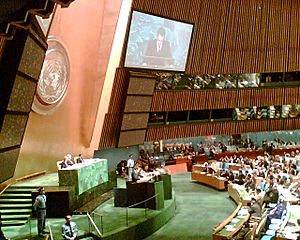
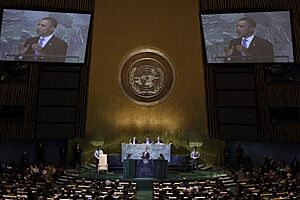
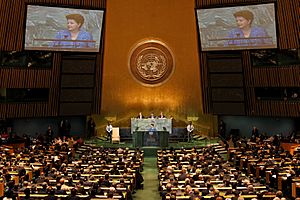
The general debate for each new session happens the week after the official opening. It usually lasts for nine working days. This is a very important event. It is often attended by country leaders, government ministers, and UN representatives. During the general debate, countries can talk about issues they think are important. Many other high-level meetings also happen during this week.
Special Sessions
Special sessions, also called UNGASS, can be called in a few ways. The Security Council can ask for one. Or, most UN member countries can ask for one. A single member can also ask, as long as most other members agree. Special sessions usually focus on one topic. They often end with an official document, like a plan to deal with that topic. These are also high-level events with leaders attending. There have been 32 special sessions in UN history.
Emergency Special Sessions
If the Security Council cannot agree on a threat to international peace, an emergency special session can be called. This usually happens if a permanent member uses its veto power. The Assembly can then suggest ways for member countries to work together to keep or bring back peace. This power was given to the Assembly in a resolution from November 1950.
Emergency special sessions can be called by the Security Council if at least seven members agree. Or, most UN member countries can call for one. If enough votes are gathered, the Assembly must meet within 24 hours. Members are told at least 12 hours before the session starts. There have been 11 emergency special sessions in UN history.
Helping Hands: Subsidiary Organs
The General Assembly has many smaller groups that help it do its work. These are called subsidiary organs. They include committees, commissions, boards, councils, and working groups.
Committees
Main Committees
There are six main committees, numbered 1 to 6:
- The First Committee: Deals with disarmament and international security.
- The Second Committee: Focuses on economic questions.
- The Third Committee: Handles social and humanitarian issues.
- The Fourth Committee: Deals with political subjects not covered by the First Committee, and with decolonization.
- The Fifth Committee: Manages the administration and budget of the United Nations.
- The Sixth Committee: Handles legal matters.
Each main committee includes all members of the General Assembly. Each committee chooses a chairman, three vice chairmen, and a rapporteur at the start of every regular session.
Other Important Committees
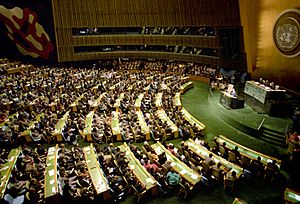
These committees are not numbered. The most important ones are:
- Credentials Committee: This committee checks that all UN representatives have the correct diplomatic papers. It has nine member countries chosen at the start of each session.
- General Committee: This committee helps make sure the Assembly's meetings run smoothly. It includes the President and Vice Presidents of the current session, and the chairman of each of the six Main Committees.
Commissions
There are six commissions that help the General Assembly:
- United Nations Disarmament Commission
- International Civil Service Commission
- International Law Commission
- United Nations Commission on International Trade Law (UNCITRAL)
- United Nations Conciliation Commission for Palestine
- United Nations Peacebuilding Commission
Boards
There are seven boards, divided into two groups: a) Executive Boards and b) Boards
Executive Boards
- Executive Board of the United Nations Children's Fund (UNICEF)
- Executive Board of the United Nations Development Programme and of the United Nations Population Fund
- Executive Board of the World Food Programme
Boards
- Board of Auditors
- Trade and Development Board
- United Nations Joint Staff Pension Board
- Advisory Board on Disarmament Matters
Councils and Panels
The newest council is the United Nations Human Rights Council, which started in March 2006. There are a total of four councils and one panel.
Working Groups and Other Bodies
There are also many different working groups and other smaller bodies that help the General Assembly.
Seating Arrangements
Countries are seated in the General Assembly in alphabetical order based on their English names. The country that sits in the very front-left seat changes each year. It is chosen by the Secretary-General through a random draw. All other countries then follow alphabetically after it.
Making the UNGA Better
In 2005, Secretary-General Kofi Annan suggested ways to improve the General Assembly. He said it sometimes focused too much on everyone agreeing, which could make resolutions weaker. He also thought the Assembly tried to do too many things instead of focusing on the most important issues. Annan suggested making the agenda simpler and strengthening the role of the Assembly's President.
These ideas for change were discussed at a big UN meeting in September 2005. The meeting agreed that the General Assembly is the main place for discussion and policy-making at the UN. It also called for better teamwork between the General Assembly and other main UN parts.
Some people have suggested creating a United Nations Parliamentary Assembly. This would be a new part of the UN system. It could allow citizens around the world to directly elect members to a UN parliament.
In 2010, Venezuela's representative, Jorge Valero, said that the UN needed big changes. He felt that the current way the UN works was not enough for the 21st century. He pointed out that some resolutions, like those about the Cuban embargo, did not lead to action. Venezuela also suggested removing the veto power in the Security Council.
Ideas for changing the UN General Assembly include giving it more power. For example, it could check how well countries follow its resolutions. It could also have more power compared to the United Nations Security Council. The goal is to make debates more useful and less repetitive.
In 2024, the UN General Assembly approved the "Pact for the Future." This plan aims to deal with big global challenges. These include climate change, rules for artificial intelligence, inequality, and conflicts. The pact also calls for changes to the Security Council and more involvement of young people and women in decision-making.
Meetings on the Sidelines
The yearly meeting of the United Nations General Assembly also includes many separate meetings. These are often called "sideline" meetings. World leaders meet independently to discuss various topics. This week in New York City also attracts many important people from around the world. They come to talk about humanitarian issues, the environment, business, and politics.
See also
 In Spanish: Asamblea General de las Naciones Unidas para niños
In Spanish: Asamblea General de las Naciones Unidas para niños
- History of the United Nations
- List of current permanent representatives to the United Nations
- Reform of the United Nations
- United Nations Interpretation Service
- United Nations System
- PassBlue
 | Jessica Watkins |
 | Robert Henry Lawrence Jr. |
 | Mae Jemison |
 | Sian Proctor |
 | Guion Bluford |


